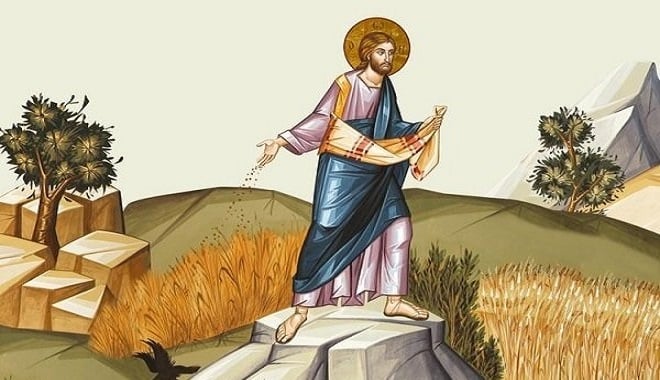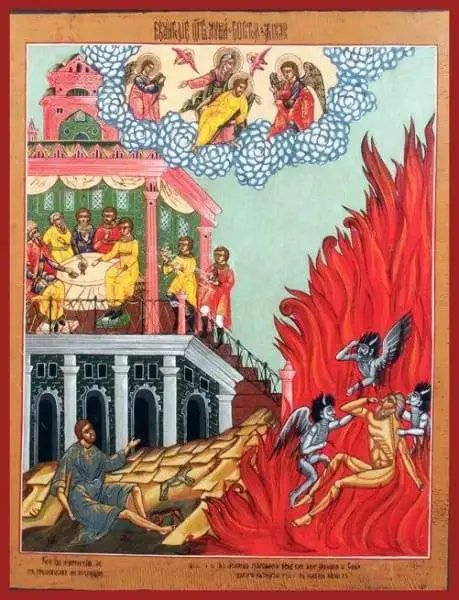
In the Name of the Father, and of the Son, and of the Holy Spirit. Amen.
In the Name of the Father, and of the Son, and of the Holy Spirit. Amen.
Beloved brothers and sisters in Christ, as we stand at the threshold of the Triodion, the Church in her divine wisdom directs our attention to the parable of the Publican and the Pharisee (Luke 18:10-14). This parable is not only a story but a profound spiritual lesson, a call to self-examination as we prepare for the great journey of Lent. It is significant that the first theme of this preparatory period is pride, for pride is the root of all sin and the greatest obstacle to our union with God.
Why does the Church begin the Triodion with this theme? Because pride is the first sin, the sin that led to the fall of Lucifer, the brightest of the angels, who in his arrogance sought to exalt himself above God. It is the sin that corrupted Adam and Eve, who desired to be “like God” (Genesis 3:5) apart from Him. Pride is the poison that distorts our relationship with God and with one another. It is the antithesis of humility, which is the foundation of all virtue and the doorway to repentance.
The Pharisee in today’s parable embodies this destructive pride. He stands in the temple, boasting of his accomplishments: “God, I thank You that I am not like other men—extortioners, unjust, adulterers, or even as this tax collector. I fast twice a week; I give tithes of all that I possess” (Luke 18:11-12). His prayer is not a true offering to God but a self-congratulatory monologue. He measures himself against others, exalting himself in his own eyes. Yet, as St. John Chrysostom warns, “The one who exalts himself will be humbled, but the one who humbles himself will be exalted” (Luke 18:14). The Pharisee’s pride blinds him to his own need for God’s mercy, and thus, he leaves the temple unjustified.
In contrast, the Publican stands afar off, unwilling even to lift his eyes to heaven. He beats his breast and cries out, “God, be merciful to me, a sinner!” (Luke 18:13). His prayer is short but profound, arising from a heart broken by the weight of his sins. He does not compare himself to others but recognizes his own unworthiness before God. This humility opens the floodgates of divine mercy, for as St. Isaac the Syrian teaches, “Humility is the robe of the Divine Nature, the garment of the Godhead. The Word Who became man clothed Himself in it, and through it He spoke to us in our bodies.”
The Church begins the Triodion with the theme of pride to remind us that without humility, all our spiritual efforts are in vain. Fasting, prayer, and almsgiving are meaningless if they are tainted by self-righteousness. St. Basil the Great writes, “If we fast without humility, our fasting is but a hunger strike. If we pray without humility, our prayers are but empty words. If we give alms without humility, our charity is but a display of vanity.” Pride corrupts even the most virtuous acts, turning them into instruments of self-glorification rather than offerings to God.
Pride is also the greatest barrier to repentance. St. John Climacus, in The Ladder of Divine Ascent, identifies pride as the culmination of all the passions, the deadliest of the spiritual diseases. He writes, “Pride is the utter poverty of the soul, disguised as riches. It is the denial of God, the invention of the devil, and the mother of all condemnation.” When we are prideful, we cannot see our sins, and if we cannot see our sins, we cannot repent. This is why the Church calls us to confront pride at the outset of the Triodion, so that we may enter the season of Lent with contrite hearts, ready to receive God’s grace.
The New Martyrs and Confessors of the Russian Church are modern-day examples of the Publican’s humility and faith. In the face of brutal persecution, they did not boast of their own strength or righteousness. Instead, they relied entirely on God’s mercy and grace, confessing Christ even unto death.
Consider Metropolitan Benjamin of Petrograd, who was sentenced to death during the Bolshevik persecution. At his trial, he did not defend himself with pride or anger but spoke with humility and love, even blessing his accusers. His final words were: “I do not know what sentence you will pass on me, but whatever it is, I will raise my hands to heaven and say, ‘Glory to Thee, O Lord, glory to Thee!’”
Or think of Maria of Paris, who served the poor and homeless in the midst of war and revolution. She once said, “The way to God lies through love of people. At the Last Judgment, I shall not be asked whether I was successful in my ascetic exercises or how many prostrations I made. I shall be asked, did I feed the hungry, clothe the naked, visit the sick and the prisoners?” Her life was a living prayer of humility and service.
The New Martyrs and Confessors remind us that true faith is not about external piety or self-righteousness but about humility, love, and unwavering trust in God. They endured unimaginable suffering, yet they did so with joy, knowing that their strength came not from themselves but from Christ.
As we prepare for Great Lent, let us follow the example of the humble Publican and the steadfast New Martyrs and Confessors of the Russian Church. Approaching God with sincere humility, we confess our sins and ask for His boundless mercy, remembering that we are all sinners in need of salvation and that no one is beyond the reach of His grace. At the same time, the New Martyrs show us what it truly means to live and, if necessary, to die for Christ. In a world that exalts pride, power, and self-sufficiency, their witness calls us to embrace the path of humility, trusting in God’s mercy and striving to love others as Christ loves us, bearing our crosses with faith and courage, knowing that His grace is sufficient in all things.
May the Lord grant us the grace to walk in humility, to repent sincerely, and to pray from the depths of our hearts. Amen.
Copyright © 2025 The Rev. Adrian Augustus. The Russian Orthodox Church of the Archangel Michael, Blacktown, NSW


